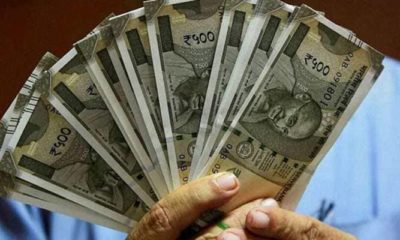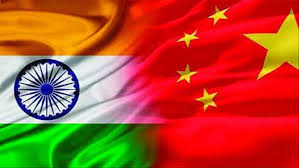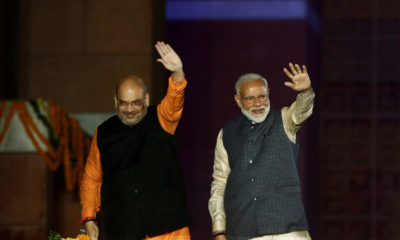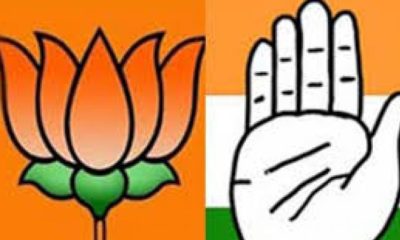Feature
Celebration in JNU after Kanhaiya freed from Tihar, jibes back at Modi, RSS

 New Delhi: JNU student leader Kanhaiya Kumar, arrested for sedition 20 days ago, was released from the Tihar Jail here on Thursday evening and returned to the university campus amid noisy celebrations by hundreds of students and teachers. He said that though he was against Modi government but was with his statement, ‘Satyameva Jayate’.
New Delhi: JNU student leader Kanhaiya Kumar, arrested for sedition 20 days ago, was released from the Tihar Jail here on Thursday evening and returned to the university campus amid noisy celebrations by hundreds of students and teachers. He said that though he was against Modi government but was with his statement, ‘Satyameva Jayate’.
As the sprawling Jawaharlal Nehru University campus was enveloped in darkness after street lights mysteriously went off before Kanhaiya Kuamr’s return, slogan-shouting students massed in the open holding flaming torches and carrying placards and posters hailing the student leader.
“We are all relaxed that Kanhaiya is back but the fight is far from over,” PhD student Priyanka Das told IANS, summing up the general mood in the student community.
“We will maintain the solidarity till Anirban (Bhattacharya) and Umar (Khalid) are back and safe,” she added, referring to the two other student activists who too are in jail on sedition charges.
He again reiterated that our nation should be free of RSS. Das, who is with the Centre for English Studies, said the JNU community “must not give up until students are safe inside and outside the campus”.
Added another student, Monika Gupta: “Kanhaiya’s release is an happy hour for all the students.”
JNU Assistant Professor Rohit Azad told IANS: “As you can see, the JNU community has gathered here in full support. It is a relief that Kanhaiya is back.”
The February 12 arrest of Kanhaiya Kumar, the first president of the JNU Students Union from the CPI-affiliated AISF, was widely denounced, more so after he was beaten up in a Delhi court on two days by some lawyers.
Delhi Police kept claiming that they had irrefutable evidence that Kanhaiya Kumar had raised anti-national slogans but failed to come up with the evidence in the court, weakening their case.
On Wednesday, the Delhi High Court gave a six-month interim bail to the jailed student leader but made wide-ranging observations on issues such as nationalism and love for the country that were quickly lapped up by the establishment and denounced by legal experts as unwarranted.
Judge Pratibha Rani told Kanhaiya Kumar to ensure that no “anti-national” activity took place in the JNU.
Wednesday’s bail order sparked wild celebrations in the JNU by students, particularly those from leftist groups. On Thursday, there were fears that there may be clashes between leftist and rightist student groups.
But the situation in the JNU was largely peaceful although surcharged even as activists ranged against Kanhaiya Kumar gathered outside the JNU’s main entrance.
Kanhaiya Kumar, who comes from a poor family in Bihar, eventually entered the university through a side gate.
The JNU Teachers Association (JNUTA), which actively backed Kanhaiya Kumar, welcomed his release but said it was concerned over the two other students still in custody.
“The JNUTA reiterates its demand that the sedition and criminal conspiracy cases based on frivolous videos be immediately withdrawn,” its Secretary Bikramaditya Choudhary told the media.
Earlier, two JNU professors and one of his lawyers reached the Tihar Jail with judicial orders for his release.
Kanhaiya Kumar was released around 6.30 p.m., Mukesh Prasad, the jail’s deputy inspector general, told IANS.
Advocate Vrinda Grover told IANS that Kanhaiya Kumar’s surety of Rs.10,000 had been furnished.
The student leader has repeatedly denied the charges hurled at him. According to forensic experts, at least two of the seven videos which the police used to act against him had been doctored.
Entertainment
Meghalaya Reserves Legalized Gambling and Sports Betting for Tourists

The State Scores Extra High on Gaming-Friendly Industry Index
Meghalaya scored 92.85 out of 100 possible points in a Gaming Industry Index and proved to be India’s most gaming-friendly state following its recent profound legislation changes over the field allowing land-based and online gaming, including games of chance, under a licensing regime.
The index by the UK India Business Council (UKIBC) uses a scale of 0 to 100 to measure the level of legalisation on gambling and betting achieved by a state based on the scores over a set of seven different games – lottery, horse racing, betting on sports, poker, rummy, casino and fantasy sports
Starting from February last year, Meghalaya became the third state in India’s northeast to legalise gambling and betting after Sikkim and Nagaland. After consultations with the UKIBC, the state proceeded with the adoption of the Meghalaya Regulation of Gaming Act, 2021 and the nullification of the Meghalaya Prevention of Gambling Act, 1970. Subsequently in December, the Meghalaya Regulation of Gaming Rules, 2021 were notified and came into force.
All for the Tourists
The move to legalise and license various forms of offline and online betting and gambling in Meghalaya is aimed at boosting tourism and creating jobs, and altogether raising taxation revenues for the northeastern state. At the same time, the opportunities to bet and gamble legally will be reserved only for tourists and visitors.
“We came out with a Gaming Act and subsequently framed the Regulation of Gaming Rules, 2021. The government will accordingly issue licenses to operate games of skill and chance, both online and offline,” said James P. K. Sangma, Meghalaya State Law and Taxation Minister speaking in the capital city of Shillong. “But the legalized gambling and gaming will only be for tourists and not residents of Meghalaya,” he continued.
To be allowed to play, tourists and people visiting the state for work or business purposes will have to prove their non-resident status by presenting appropriate documents, in a process similar to a bank KYC (Know Your Customer) procedure.
Meghalaya Reaches Out to a Vast Market
With 140 millions of people in India estimated to bet regularly on sports, and a total of 370 million desi bettors around prominent sporting events, as per data from one of the latest reports by Esse N Videri, Meghalaya is set to reach out and take a piece of a vast market.
Estimates on the financial value of India’s sports betting market, combined across all types of offline channels and online sports and cricket predictions and betting platforms, speak about amounts between $130 and $150 billion (roughly between ₹9.7 and ₹11.5 lakh crore).
Andhra Pradesh, Telangana and Delhi are shown to deliver the highest number of bettors and Meghalaya can count on substantial tourists flow from their betting circles. The sports betting communities of Karnataka, Maharashtra, Uttar Pradesh and Haryana are also not to be underestimated.
Among the sports, cricket is most popular, registering 68 percent of the total bet count analyzed by Esse N Videri. Football takes second position with 11 percent of the bets, followed by betting on FIFA at 7 percent and on eCricket at 5 percent. The last position in the Top 5 of popular sports for betting in India is taken by tennis with 3 percent of the bet count.
Local Citizens will Still have Their Teer Betting
Meghalaya residents will still be permitted to participate in teer betting over arrow-shooting results. Teer is a traditional method of gambling, somewhat similar to a lottery draw, and held under the rules of the Meghalaya Regulation of the Game of Arrow Shooting and the Sale of Teer Tickets Act, 2018.
Teer includes bettors wagering on the number of arrows that reach the target which is placed about 50 meters away from a team of 20 archers positioned in a semicircle.
The archers shoot volleys of arrows at the target for ten minutes, and players place their bets choosing a number between 0 and 99 trying to guess the last two digits of the number of arrows that successfully pierce the target.
If, for example, the number of hits is 256, anyone who has bet on 56 wins an amount eight times bigger than their wager.























